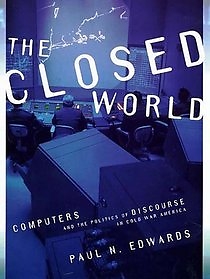The Closed World offers a radically new alternative to the canonical histories of computers and cognitive science. Arguing that we can make sense of computers as tools only when we simultaneously grasp their roles as metaphors and political icons.
The Closed World explores three apparently disparate histories - the history of American global power, the history of computing machines, and the history of subjectivity in science and culture - through the lens of the American political imagination. In the process, it reveals intimate links between the military projects of the Cold War, the evolution of digital computers, and the origins of cybernetics, cognitive psychology, and artificial intelligence.
Edwards begins by describing the emergence of a "closed-world discourse" of global surveillance and control through high-technology military power. The Cold War political goal of "containment" led to the SAGE continental air defense system, Rand Corporation studies of nuclear strategy, and the advanced technologies of the Vietnam War. These and other centralized, computerized military command and control projects - for containing world-scale conflicts - helped closed-world discourse dominate Cold War political decisions. Their apotheosis was the Reagan-era plan for a "Star Wars" space-based ballistic missile defense.
Edwards then shows how these military projects helped computers become axial metaphors in psychological theory. Analyzing the Macy Conferences on cybernetics, the Harvard Psycho-Acoustic Laboratory, and the early history of artificial intelligence, he describes the formation of a "cyborg discourse." By constructing both human minds and artificial intelligences as information machines, cyborg discourse assisted in integrating people into the hyper-complex technological systems of the closed world.
Finally, Edwards explores the cyborg as political identity in science fiction - from the disembodied, panoptic AI of 2001: A Space Odyssey, to the mechanical robots of Star Wars and the engineered biological androids of Blade Runner - where Information Age culture and subjectivity were both reflected and constructed.
